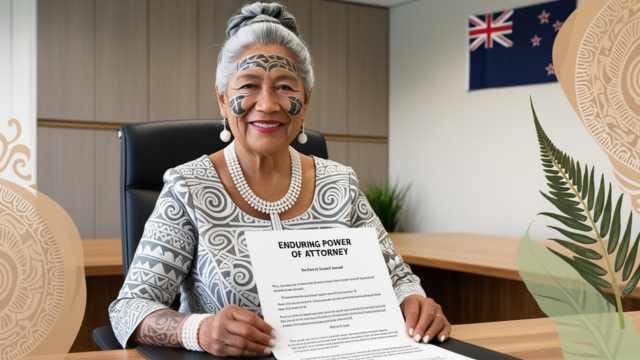An enduring power of attorney (EPA) is a legal document in New Zealand that allows someone to appoint another person to make decisions on their behalf if they become unable to do so themselves. This article provides a comprehensive guide to understanding EPAs, their types, benefits, and essential considerations.
What Is an Enduring Power of Attorney (EPA)?
An enduring power of attorney (EPA) in New Zealand is a crucial legal document that ensures your interests are protected when you’re unable to make decisions for yourself. This guide will help you understand what an EPA is, why it’s essential, and how you can establish one to protect your assets and well-being.
Understanding the Enduring Power of Attorney (EPA)
An Enduring Power of Attorney (EPA) is a legal document that lets you, as the “donor,” appoint someone you trust to make decisions on your behalf. This trusted individual, known as your “attorney” (not necessarily a lawyer), can manage your finances, property, and even your health care if you’re unable to do so. What makes an EPA unique is that it remains valid even if you lose the mental capacity to make decisions, unlike a general power of attorney.
There are two types of EPAs in New Zealand:
| Type of EPA | What It Covers |
|---|---|
| EPA for Property | Allows your attorney to make decisions about your property, finances, and assets. This can include paying bills, managing investments, or selling assets. |
| EPA for Personal Care and Welfare | Covers personal care decisions if you’re unable to make them. This may include where you live, daily care decisions, and specific health care needs. |
Note: You can appoint the same person for both types or assign different people to each.
Why You Should Have an EPA
Having an EPA is more than just a legal safeguard; it provides peace of mind for both you and your loved ones. Here are some key reasons why an EPA is invaluable:
- Protection in Case of Incapacity: Life can be unpredictable, and if you’re ever in an accident or fall seriously ill, an EPA ensures that someone you trust will handle your affairs.
- Ensures Your Wishes Are Respected: With an EPA, you can specify what your attorney can or cannot do, making sure that they align their decisions with your values and wishes.
- Reduces Family Burden: By appointing an attorney in advance, you can prevent family disputes about who should manage your affairs and how to handle various matters.
How to Set Up an Enduring Power of Attorney
Creating an EPA involves a few essential steps:
- Select Your Attorney: Carefully choose someone trustworthy, responsible, and capable of managing the tasks required. You can also choose multiple people as your attorneys, or even an organization.
- Determine the Scope: Specify what powers your attorney will have, such as managing all your finances or only specific accounts. For an EPA on personal care and welfare, you may want to outline the types of decisions they can make.
- Seek Legal Advice: Consulting a lawyer is recommended for drafting an EPA. They’ll ensure you understand what you’re signing and confirm that it reflects your intentions.
- Sign the Document: Once ready, both you and your attorney must sign the EPA document in the presence of a witness. This makes the document legally binding.
Note: If there are any doubts about your mental capacity, you may need a doctor’s certificate to proceed.
Responsibilities and Duties of an Attorney
Once appointed, your attorney has several duties that must be followed:
- Act in Your Best Interests: The attorney must always put your interests first and make decisions that benefit you.
- Maintain Detailed Records: Every decision and transaction should be recorded meticulously to avoid any misunderstandings or legal issues.
- Avoid Conflicts of Interest: An attorney must be impartial and avoid making decisions that might personally benefit them.
- Respect Your Wishes: The attorney should respect your values and follow any specific instructions you’ve left, such as preferences for health care or property management.
Advantages and Limitations of an EPA
While an EPA is beneficial, it’s essential to know both its advantages and limitations:
| Advantages | Limitations |
|---|---|
| Peace of Mind: Ensures your affairs are in trusted hands. | Limited Powers: Attorney’s powers are only what’s specified in the EPA. |
| Legal Validity: Attorneys have clear legal authority. | Not Absolute: Can be challenged if misused. |
| Simplifies Decision-Making: Reduces burden on family. | Ends Upon Death: EPA cannot dictate posthumous matters. |
Common Myths About Enduring Power of Attorney
There are many misconceptions about EPAs, so let’s clear up a few:
1. “The attorney has unlimited power.”
This is incorrect. An attorney can only make decisions within the scope outlined in the EPA document.
2. “EPAs are only for elderly people.”
Anyone over 18 can benefit from an EPA. Unexpected events can happen at any age, and an EPA provides security no matter your stage in life.
3. “The EPA replaces my will.”
An EPA is only valid while you’re alive; it ends upon your death. A will governs how your affairs are handled after death, whereas an EPA covers personal and property decisions if you become incapacitated.
Conclusion: The Value of an Enduring Power of Attorney
In summary, an Enduring Power of Attorney is essential for anyone who wants to ensure their wishes and interests are respected if they become incapacitated. Whether it’s managing finances or making welfare decisions, an EPA allows you to appoint a trusted person to act on your behalf. Setting up an EPA may feel daunting, but the peace of mind it brings is invaluable for you and your family. By taking the time to prepare an EPA, you’re securing your future and ensuring that your affairs will be handled according to your values and needs.

